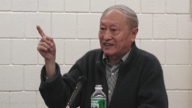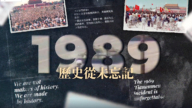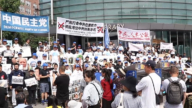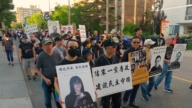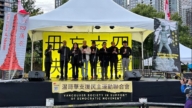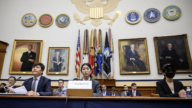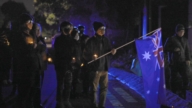【新唐人2012年12月21日讯】北京新闻界人士最新透露,作为中共喉舌的中央报刊总编辑,第一个向“六四”遭受迫害的记者与编辑“公开道歉”的,是前《中国青年报》的总编徐祝庆。报导说,他的道歉,为他的政治生涯画上了完美的句号。
《博讯网》引述知情人透露的消息,早在2004年,前《中青报》总编徐祝庆卸任的时刻,他在报社编辑部的欢送宴席上,公开向六四以后曾经受到处分和受过伤害的同事道歉。
报导说,作为一个副部级干部,徐祝庆是第一个向六四受迫害的记者、编辑,公开道歉的中共中央报刊总编辑。
前《中国青年报》资深编辑李大同认为,六四期间很多官员身不由己。
前《中国青年报》资深编辑 李大同:“1.57每个正直的人都会这样。你每个正直的人都会这样。官员你在89(年)的时候就不得不做某些事情。实际上他是不想做的。退休的时候他表达歉意。”
在“八九民运”期间,《中国青年报》在头版刊登了大幅照片,报导《中国青年报》记者与编辑参加游行。报导说,在“4.26社论”的污蔑面前,《中国青年报》的记者和编辑,串联北京新闻界的同仁,发布了“首都新闻界两千多记者编辑给中央的公开信”,要求“新闻讲真话,民主改革和肯定学生的爱国热情”。
由于北京的新闻界介入了学潮,成为“学潮”扩大为“民运”的一个转折点,之后,民主党派及各界人士也纷纷加入。
当时的政治局常委胡启立到《中国青年报》与记者、编辑座谈,并传递了赵紫阳关于“新闻界可以开放一些”的讲话。当时,在中国新闻史上有过所谓“短暂的春天”。
《中青报》王牌栏目—-《冰点》周刊的创刊编辑及主编李大同,当时负责撰写和提交那封“新闻界给中央的公开信”。
李大同:“2.54送上去第三天,胡启立就到报社来对话了。我们谈了三四个小时。谈的很好。但是你覆巢之下安有完卵,胡启立自己也没有保住。就不要说这些人了。”
“八九民运”被坦克、机枪暴力镇压后,新闻界也开始了“大整肃”,《中国青年报》也不例外。提交新闻界请愿书的李大同被撤职,部分记者、编辑被迫离开了报社。
据台湾《联合报》1989年5月10号的报导,1,031名北平新闻记者及编辑联署,争取新闻自由,呈递请愿书,要求与中共党中央主管宣传的领导“对话”,“北京大学”及“北京师范大学”的部分学生到场声援、呼口号,引来大批中外记者到场“采访”,成为中共有史以来,规模最大的一次“争取新闻自由”的运动。
《联合报》六四期间的报导说,请愿代表李大同宣读公开信的内容,并指出,请愿动机是,那段时间以来,中国新闻界连续发生海内外瞩目的重大事件,但北京记者没有做到全面公正、客观报导。经反省后,记者发现是现行体制使然,因此希望和中共中央主管宣传的领导对话,把体制推到新高点。
另一名大陆记者在公开信的发布会上指出,他们联署是基于新闻良心。因为常有人问他们,每发生重大事件,大陆新闻界即“短路”?尤其这次学生运动,学生转向对外籍记者要求支持,实在使大陆新闻界尴尬,因此他们忍无可忍,要求与党中央对话。
《博讯》引述消息说:徐祝庆在2004年卸任的时候,预感六四总有一天会平反。
采访编辑/秦雪 后制/萧宇
First CCP Newspaper Chief Editor to Apologizes for Actions in “6.4 Pro-Democracy Movement”.
Media reported that Beijing media professionals recently
disclosed that Xu Zhuqing made a first public apology to
reporters and editors who were punished for involvement
in the “June 4th pro-democracy movement” of 1989.
In 1989, Xu was then-chief editor of China Youth Daily,
a mouthpiece of the Chinese Communist Party (CCP).
The report reviewed that the apology
gave a perfect end to Xu’s political career.
Boxun.com quoted informed sources, saying that
on his retirement farewell in 2004, Xu Zhuqing openly
apologized to his colleagues who had been punished for
participating in the June 4th pro-democracy movement.
The report said that as a vice-ministerial level CCP cadre,
Xu Zhuqing is the first chief-editor of a CCP central
newspaper who has made such a pubic apology.
Li Datong, former senior editor of the China
Youth Daily, says that in 1989, many CCP officials did not act of their own free will.
Li Datong: “Every person of integrity has such feelings.
In 1989, those officials had to do something,
but in fact, that was not their own free will.
So he apologized for this when he retired.”
During the 1989 pro-democracy movement, China
Youth Daily published on the front page a large photo
of its journalists and editors walking in the march.
The report said that in facing the slander of “4-26 Editorial,"
the newspaper’s journalists and editors and Beijing’s
media professionals jointly released an open letter.
This was entitled, “An Open Letter to the Central
Committee by Beijing’s over 2,000 Journalists & Editors.”
They requested “truth-telling news reports, democratic
reforms, and affirmation of students’ patriotic enthusiasm.”
Beijing press circles’ participation of the 6.4. student
movement enlarged it into a “pro-democracy movement”.
Afterwards, China’s democratic parties
and people from all walks of life joined in.
Hu Qili, then-member of the CCP Politburo
Standing Committee, held a talk with China Youth Daily reporters and editors.
Hu Qili conveyed Zhao Ziyang’s speech
on “some opening-up in the press”.
At that time, a “short spring" befell on China’s media world.
Freezing Point magazine is China Youth Daily’s ace program.
Its then-editor chief Li Datong
wrote and submitted that open letter.
Li Datong: “Three days later after I had handed
it in, Hu Qili went to the newspaper office.
We talked for three or four hours,
and communicated very well.
But when the nest is overturned, no egg stays unbroken.
Hu Qili was later ousted from
the Politburo Standing Committee.
Let alone considering the fate
of these journalists and editors.”
The CCP’s tanks and guns suppressed
the 1989 pro-democracy movement.
China’s media world underwent a great
purging, with China Youth Daily no exception.
Li Datong was dismissed, and some reporters
and editors were forced to leave the newspaper.
According to Taiwan’s United Daily News (UDN)
report dated May 10 1989, 1,031 journalists and editors in Beijing addressed a petition.
It asked for a “dialogue” with the CCP propaganda chief.
Students from Peking University and Beijing Normal
University chanted slogans on site to give support.
Lots of Chinese and foreign journalists conducted
on-site interviews, which was the largest campaign for “freedom of the press” since 1949.
The UDN reported that Li Datong read the open letter
in public, and disclosed the motive behind the petition.
It was because in that period of time, a series
of sensational events occurred in China’s press circles.
However, Beijing journalists did not
give full and impartial coverage.
With introspection, they found out the
reason was due to the existing system.
Therefore, they asked for a dialogue with the CCP
propaganda chief to contribute to improve the system.
Reportedly, at the news conference for the
open letter, a journalist said that the petition was based on conscience in media.
They were often asked why China’s media
always shorted out for every major event ?
In particular, in the 6.4 movement, students
sought support from foreign journalists, which really made China’s media feel embarrassed.
Being driven beyond forbearance, they urged dialogue
with the Party’s Central Committee, said the journalist.
According to the Boxun.com news report, sources said
that when retired in 2004, Xu Zhuqing predicted a future vindication of the 6.4 pro-democracy movement.


